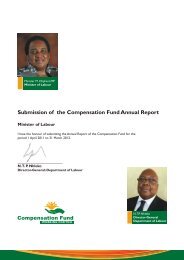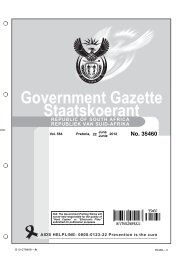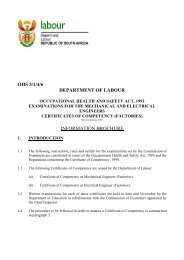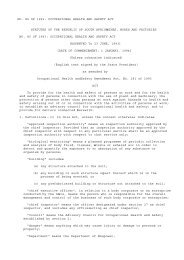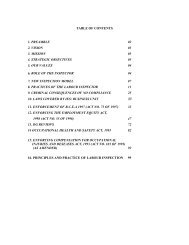Domestic Workers, what you should know - Department of Labour
Domestic Workers, what you should know - Department of Labour
Domestic Workers, what you should know - Department of Labour
Create successful ePaper yourself
Turn your PDF publications into a flip-book with our unique Google optimized e-Paper software.
<strong>Domestic</strong> <strong>Workers</strong><strong>what</strong> <strong>you</strong> <strong>should</strong> <strong>know</strong>minimum wages and conditions <strong>of</strong> employmentpage 1
page 2
GUIDELINES1. Notice period and termination <strong>of</strong> employmentIn terms <strong>of</strong> the Sectoral Determination, any party to an employment contract mustgive written notice, except when an illiterate domestic worker gives it, as follows:• One week, if employed for six months or less• Four weeks if employed for more than six months.Notice must be explained orally by or on behalf <strong>of</strong> the employer to a domesticworker if he/she is not able to understand it.The employer is required to provide the domestic worker who resides inaccommodation that is situated on the premises <strong>of</strong> the employer or that is suppliedby the employer, with accommodation for a period <strong>of</strong> one month, or if it is a longerperiod, until the contract <strong>of</strong> employment could lawfully have been terminated.All monies due to the domestic worker for any wages, allowance or otherpayments that have not been paid, paid time-<strong>of</strong>f not taken and pro-rata leave mustbe paid.2. Procedure for termination <strong>of</strong> employmentWhilst the contract <strong>of</strong> employment makes provision for termination <strong>of</strong> employment,it must be understood that the services <strong>of</strong> an employee may not be terminatedunless a valid and fair reason exists and fair procedure is followed. If an employeeis dismissed without a valid reason or without a fair procedure, the employee mayapproach the CCMA for assistance.Pro-rata leave and severance pay might be payable.In the event <strong>of</strong> a domestic worker being unable to return to work due to disability,the employer must investigate the nature <strong>of</strong> the disability and ascertain whetheror not it is permanent or temporary. The employer must try to accommodate theemployee as far as possible for example, amending or adapting their duties to suitthe disability. However, in the event <strong>of</strong> it not being possible for the employer toadapt the domestic workers’ duties and/or to find alternatives, then such employermay terminate the services <strong>of</strong> the domestic worker.The <strong>Labour</strong> Relations Act, 66 <strong>of</strong> 1995 sets out the procedures to be followed at thetermination <strong>of</strong> services in the Code <strong>of</strong> Good Practice, in Schedule 8.3. Wage/Remuneration/PaymentThere is a prescribed minimum rate <strong>of</strong> remuneration. Additional payments (such asfor overtime or work on Sundays or Public Holidays) are calculated from the totalremuneration as indicated in clause 5.3 <strong>of</strong> the contract. The total remuneration ispage 3
the total <strong>of</strong> the money received by the employee and the payment in kind, whichmay not be more than 10% <strong>of</strong> the wage for accommodation.4. Transport allowances and bonusesSectoral Determination 7: <strong>Domestic</strong> Sector, South Africa does not regulate theseand are therefore open to negotiation between the parties.5. Hours <strong>of</strong> work5.1 Normal hours (excluding overtime)A domestic worker may not be made to:• work more than 45 hours a week• work more than nine hours per day for a five day work week• work more than eight hours a day for a six day work week.5.2 OvertimeA domestic worker may not work more than 15 hours overtime per week butmay not work more than 12 hours on any day, including overtime.Overtime must be paid at one and a half times the employee’s normal wageor an employee may agree to receive paid time-<strong>of</strong>f.5.3 Daily and weekly rest-periods5.3.1 A daily rest period <strong>of</strong> 12 consecutive hours and a weekly rest period<strong>of</strong> 36 consecutive hours, which must include Sunday, unlessotherwise agreed, must be allowed.5.3.2 The daily rest period may, by agreement, be reduced to 10 hours foran employee who lives on the premises whose meal interval lasts forat least three hours.5.3.3 The weekly rest period may by agreement be extended to60 consecutive hours every two weeks or be reduced to eighthours in any week if the rest period in the following week isextended equivalently.5.4 Standby5.4.1 Standby means any period between 20:00 and 06:00 the next daywhen a domestic worker is required to be at the workplace and ispermitted to rest or sleep but must be available to work if necessary.page 45.4.2 May only done if it is agreed in writing and on not more than fivetimes per month must be compensated by the payment <strong>of</strong> anallowance <strong>of</strong> at least R30,00 per shift.
5.5 Night work – after 18:00 and before 06:005.5.1 Worked only if agreed to in writing and must be compensated by anallowance; and if the domestic resides at the workplace or transportis available between the domestic worker’s place <strong>of</strong> residence andthe workplace at the beginning and the end <strong>of</strong> the domesticworker’s shift.6. Meal intervalsA domestic worker is entitled to a one-hour break for a meal after not more thanfive hours work. Such interval may be reduced to 30 minutes, by agreementbetween the parties. When a second meal interval is required because <strong>of</strong> overtimeworked, it may be reduced to not less than 15 minutes. If required or permitted towork during this period, remuneration must be paid.7. Sunday workWork on Sundays is voluntary and a domestic worker can therefore not be forcedto work on a Sunday.If the employee works on a Sunday he/she shall be paid double the daily wage.If the employee ordinarily works on a Sunday he/she shall be paid one and a halftimes the wage for every hour worked. Paid time-<strong>of</strong>f in return for working on aSunday may be agreed upon.8. Public holidaysThe days mentioned in the Public Holidays Act must be granted but the partiescan agree to further public holidays. Work on a public holiday is entirely voluntaryand a domestic worker may not be forced to work on such public holiday.The <strong>of</strong>ficial public holidays are:New Years DayHuman Rights DayGood FridayFamily DayFreedom Day<strong>Workers</strong> DayYouth DayNational Woman’s DayHeritage DayDay <strong>of</strong> ReconciliationChristmas DayDay <strong>of</strong> Goodwill• Any other day declared an <strong>of</strong>ficial public holiday from time to time <strong>should</strong> alsobe granted• These days can be exchanged for any other day by agreement• If the employee works on a public holiday he/she shall be paid double thenormal day’s wage.page 5
9. Annual leaveAnnual leave may not be less than three weeks per year for full-time workers orby agreement, one day for every 17 days worked or one hour for every 17 hoursworked.The leave must be granted not later than six months after completion <strong>of</strong> theperiod <strong>of</strong> 12 consecutive months <strong>of</strong> employment. The leave may not be grantedconcurrent with any period <strong>of</strong> sick leave, nor with a period <strong>of</strong> notice <strong>of</strong> termination<strong>of</strong> the contract <strong>of</strong> employment.10. Sick leaveDuring every sick leave cycle <strong>of</strong> 36 months an employee is entitled to an amount<strong>of</strong> paid sick leave equal to the number <strong>of</strong> days the employee would normally workduring a period <strong>of</strong> six weeks.During the first six months <strong>of</strong> employment, an employee is entitled to one day’spaid sick leave for every 26 days worked.The employer is not required to pay an employee if the employee has been absentfrom work for more than two consecutive days or on more than two occasionsduring an eight-week period and, on request by the employer, does not produce amedical certificate stating that the employee was unable to work for the duration <strong>of</strong>the employee’s absence on account <strong>of</strong> sickness or injury.11. Maternity leaveThe employee is entitled to at least four consecutive months’ maternity leave. Theemployer is not obliged to pay the domestic worker for the period for which she is<strong>of</strong>f work due to her pregnancy. However the parties may agree that the domesticworker will receive part <strong>of</strong> or her entire salary/wage for the time that she is <strong>of</strong>f dueto pregnancy.12. Family responsibility leaveEmployees employed for longer than four months and for at least four days a weekare entitled to take five days’ paid family responsibility leave during each leavecycle when the employee’s child is born, or when the employee’s child is sick or inthe event <strong>of</strong> the death <strong>of</strong> the employee’s spouse or life partner or parent, adoptiveparent, grandparent, child, adopted child, grandchild or sibling.13. Deduction from the remunerationpage 6The Sectoral Determination prohibits an employer from deducting any monies fromthe workers wages without his/her written permission.
A deduction <strong>of</strong> not more than 10% <strong>of</strong> the wage may be deducted for a room orother accommodation provided it is kept in a good condition has at least onewindow and a door, which can be locked, and he/she has access to a bathroom.14. Other issuesThere are certain other issues which are not regulated by the SectoralDetermination such as probationary periods, right <strong>of</strong> entry to the employerspremises, afternoons <strong>of</strong>f, weekends <strong>of</strong>f and pension schemes, medical aidschemes, training/school fees, funeral benefits and savings account, howeverthe aforementioned may be negotiated between the parties and included in thecontract <strong>of</strong> employment.15. Prohibition <strong>of</strong> EmploymentThe Sectoral Determination prohibits employment <strong>of</strong> any person under the age <strong>of</strong>15 and it is therefore important for an employer to verify the age <strong>of</strong> the domesticworker by requesting a copy <strong>of</strong> the identity document or birth certificate.16. Other conditions <strong>of</strong> employmentThere is no provision, which prevents any other conditions <strong>of</strong> employment beingincluded in a contract <strong>of</strong> employment but any provision, which sets conditions,which are less favourable than those set by the Determination, would be invalid.These guidelines are not meantto be a complete summary <strong>of</strong> theSectoral Determination and/or legaladvice. Should there be any doubtas to rights and/or obligations interms <strong>of</strong> the Act or terms <strong>of</strong> anyclause <strong>of</strong> the suggested WrittenParticulars <strong>of</strong> Employment, suchqueries can be directed to the local<strong>of</strong>fice <strong>of</strong> the <strong>Department</strong> <strong>of</strong> <strong>Labour</strong>,who will gladly assist.page 7
Summary <strong>of</strong> important provisions in the <strong>Domestic</strong> WorkerSectoral DeterminationThe <strong>Department</strong> <strong>of</strong> <strong>Labour</strong> has made a law which regulates employment in thedomestic worker sector.• The law is called a Sectoral Determination for the <strong>Domestic</strong> Worker Sector• Employers are required to pay at least the prescribed minimum wages as indicatedin the Sectoral Determination• This document briefly covers some <strong>of</strong> the most important provisions in theSectoral Determination• A copy <strong>of</strong> the Sectoral Determination is available from Government Printing Worksand also on the <strong>Department</strong>’s website, at www.labour.gov.zaWhat is the purpose <strong>of</strong> the Sectoral Determination?The sectoral determination lays down conditions <strong>of</strong> employment for domestic workerssuch as hours <strong>of</strong> work, leave, termination <strong>of</strong> employment and so on. It also prescribesthe minimum wage rates that employers are required to pay.Who is covered in this Sectoral Determination?• All domestic workers in South Africa working in a private household• People employed by employment services• Independent contractors who are doing domestic work• A person doing gardening in a private home• People who look after children, sick or old people and people with disabilities in aprivate home• A person driving for the household.Who is not covered in the Sectoral Determination?• <strong>Domestic</strong> workers employed on farms• <strong>Domestic</strong> workers employed in activities covered by another sectoraldetermination or bargaining council agreement.What does the law say about wages?The law says that all domestic workers <strong>should</strong> be paid at least the minimumwage according to Tables 1 or 2, however domestic workers earning more thanthe prescribed minimum will continue to earn the higher wages, as conditions <strong>of</strong>employment cannot be changed unilaterally.page 9
Wage Tables for the <strong>Domestic</strong> Worker SectorTable 1: Minimum wages for domestic workers who work more than27 ordinary hours per weekArea ABergrivier Local Municipality, Breederivier Local Municipality, Buffalo City Local Municipality, CapeAgulhas Local Municipality, Cederberg Local Municipality, City <strong>of</strong> Cape Town, City <strong>of</strong> JohannesburgMetropolitan Municipality, City <strong>of</strong> Tshwane Metropolitan Municipality, Drakenstein Local Municipality,Ekurhulen Metropolitan Municipality, Emalahleni Local Municipality, Emfuleni Local Municipality,Ethekwini Metropolitan Unicity, Gamagara Local Municipality, George Local Municipality, HibiscusCoast Local Municipality, Karoo Hoogland Local Municipality, Kgatelopele Local Municipality,Khara Hais Local Municipality, Knysna Local Municipality, Kungwini Local Municipality, KougaLocal Municipality, Langeberg Local Municipality, Lesedi Local Municipality, Makana LocalMunicipality, Mangaung Local Municipality, Matzikama Local Municipality, Metsimaholo LocalMunicipality, Middelburg Local Municipality, Midvaal Local Municipality, Mngeni Local Municipality,Mogale Local Municipality, Mosselbaai Local Municipality, Msunduzi Local Municipality, MtubatuLocal Municipality, Nama Khoi Local Municipality, Nelson Mandela, Nokeng tsa Taemane LocalMunicipality, Oudtshoorn Local Municipality, Overstrand Local Municipality, Plettenbergbaai LocalMunicipality, Potchefstroom Local Municipality, Randfontein Local Municipality, Richtersveld LocalMunicipality, Saldanha Bay Local Municipality, Sol Plaatjie Local Municipality, Stellenbosch LocalMunicipality, Swartland Local Municipality, Swellendam Local Municipality, Theewatersklo<strong>of</strong> LocalMunicipality, Umdoni Local Municipality, uMhlathuze Local Municipality and Witzenberg LocalMunicipality.page 10Minimum rates for the period1 December 2011 to30 November 2012Minimum rates for the period1 December 2012 to30 November 2013Minimum rates for the period1 December 2013 to30 November 2014Hourly Rate (R ) 8.34 Hourly Rate (R ) Previous Hourly Rate (R )Weekly Rate (R ) 375.19* Weekly Rate (R )yearsminimumWeekly Rate (R )Monthly Rate (R ) 1625.70** Monthly Rate (R ) wage+CPI***+1%Monthly Rate (R )Minimum rates for the period1 December 2011 to30 November 2012Area BAreas not mentioned in Area AMinimum rates for the period1 December 2012 to30 November 2013Previousyearsminimumwage+CPI***+1%Minimum rates for the period1 December 2013 to30 November 2014Hourly Rate (R )Weekly Rate (R )Monthly Rate (R )7.06317.62*1376.25**Hourly Rate (R )Weekly Rate (R )Monthly Rate (R )Previousyearsminimumwage+CPI***+2%Hourly Rate (R )Weekly Rate (R )Monthly Rate (R )Previousyearsminimumwage+CPI***+2%* Indicative weekly rate for employees working a maximum <strong>of</strong> 45 ordinary hours per week.** Indicative monthly rate for employees working a maximum <strong>of</strong> 45 ordinary hours per week.*** The CPI to be utilised is the available CPI for the lowest quintile as released byStatistics South Africa, 6 weeks prior to the increment date.page 10
Table 2 Minimum wages for domestic workers who work 27 ordinary hoursper week or lessArea ABergrivier Local Municipality, Breederivier Local Municipality, Buffalo City Local Municipality,Cape Agulhas Local Municipality, Cederberg Local Municipality, City <strong>of</strong> Cape Town, City <strong>of</strong>Johannesburg Metropolitan Municipality, City <strong>of</strong> Tshwane Metropolitan Municipality, DrakensteinLocal Municipality, Ekurhulen Metropolitan Municipality, Emalahleni Local Municipality, EmfuleniLocal Municipality, Ethekwini Metropolitan Unicity, Gamagara Local Municipality, George LocalMunicipality, Hibiscus Coast Local Municipality, Karoo Hoogland Local Municipality, KgatelopeleLocal Municipality, Khara Hais Local Municipality, Knysna Local Municipality, Kungwini LocalMunicipality, Kouga Local Municipality, Langeberg Local Municipality, Lesedi Local Municipality,Makana Local Municipality, Mangaung Local Municipality, Matzikama Local Municipality,Metsimaholo Local Municipality, Middelburg Local Municipality, Midvaal Local Municipality, MngeniLocal Municipality, Mogale Local Municipality, Mosselbaai Local Municipality, Msunduzi LocalMunicipality, Mtubatu Local Municipality, Nama Khoi Local Municipality, Nelson Mandela, Nokengtsa Taemane Local Municipality, Oudtshoorn Local Municipality, Overstrand Local Municipality,Plettenbergbaai Local Municipality, Potchefstroom Local Municipality, Randfontein LocalMunicipality, Richtersveld Local Municipality, Saldanha Bay Local Municipality, Sol Plaatjie LocalMunicipality, Stellenbosch Local Municipality, Swartland Local Municipality, Swellendam LocalMunicipality, Theewatersklo<strong>of</strong> Local Municipality, Umdoni Local Municipality, uMhlathuze LocalMunicipality and Witzenberg Local Municipality.Minimum rates for the period1 December 2011 to30 November 2012Minimum rates for the period1 December 2012 to30 November 2013Minimum rates for the period1 December 2013 to30 November 2014Hourly Rate (R ) 9.75 Hourly Rate (R ) Previous Hourly Rate (R )Weekly Rate (R ) 265.94* Weekly Rate (R )yearsminimumWeekly Rate (R )Monthly Rate (R ) 1152.32** Monthly Rate (R ) wage+CPI***+1%Monthly Rate (R )Minimum rates for the period1 December 2011 to30 November 2012Area BAreas not mentioned in Area AMinimum rates for the period1 December 2012 to30 November 2013Previousyearsminimumwage+CPI***+1%Minimum rates for the period1 December 2013 to30 November 2014Hourly Rate (R )Weekly Rate (R )Monthly Rate (R )8.33224.90*974.49**Hourly Rate (R )Weekly Rate (R )Monthly Rate (R )Previousyearsminimumwage+CPI***+2%Hourly Rate (R )Weekly Rate (R )Monthly Rate (R )Previousyearsminimumwage+CPI***+2%* Indicative weekly rate for employees working a maximum <strong>of</strong> 27 ordinary hours per week.** Indicative monthly rate for employees working a maximum <strong>of</strong> 27 ordinary hours per week.*** The CPI to be utilised is the available CPI for the lowest quintile as released byStatistics South Africa, 6 weeks prior to the increment date.page 11
Calculation <strong>of</strong> wages:Wages are calculated using ordinary hours <strong>of</strong> work• Monthly wage divided by 4.333 = weekly wage• Weekly wage divided by number <strong>of</strong> ordinary hours worked in a week = Daily wage• Daily wage divided by ordinary hours worked in a day = hourly wage;Payment <strong>of</strong> wages:Wages must be paid• In South African currency• In cash or cheque or direct payment into banking account;• Daily, weekly, fortnightly or monthly;• On a normal pay day agreed to by the domestic worker;• On termination <strong>of</strong> employment.Information concerning wages (payslip):Every domestic worker must receive, on payday, a payslip showing:• The employer’s name and address• <strong>Domestic</strong> worker’s occupation• Period <strong>of</strong> payment• <strong>Domestic</strong> worker’s rate and overtime rate• Hours worked• Overtime worked• Hours worked and pay for Sundays and Public holidays• Wage• Any other pay• Details <strong>of</strong> deductions• Net payment.The payslip is the property <strong>of</strong> the domestic worker. A copy <strong>of</strong> a model payslip withthe details required has been included in this booklet.Permissible and prohibited acts concerning pay:Deductions that are allowed include:• Medical insurance• Savings• Pension or Provident fund• Trade union subscription• Order <strong>of</strong> account payment to a registered financial institution• Rentals• Loan or advance (not more than 10% <strong>of</strong> total wage).page 12Deductions that are not allowed include:• Amount greater than the actual remuneration received• Breakages (crockery, electrical appliances etc.)• Damages (Ironing)• Meals provided during working time• Clothing• Training <strong>of</strong> domestic worker.page 12
Deductions for accommodation:This may be deducted, by agreement, from wages (not more than 10% <strong>of</strong> total wage)on condition that the room:• Is weatherpro<strong>of</strong> and in a good condition• Has at least one window and door that can be locked• Is fitted with a toilet, a bath/shower or has access to another bathroom.Conditions <strong>of</strong> employmentWritten particulars <strong>of</strong> employment (see model “contract”):An employer must supply a domestic worker with written particulars <strong>of</strong> employment,containing the following:• Full name and address <strong>of</strong> the employer• Name and occupation <strong>of</strong> the domestic worker or a brief description <strong>of</strong> work• Addresses <strong>of</strong> various places <strong>of</strong> work• Date on which employment began• Ordinary hours <strong>of</strong> work and days <strong>of</strong> work• Wage or the rate and method <strong>of</strong> payment• The rate <strong>of</strong> pay for overtime work• Any other cash payments• Any payment in kind and the value there<strong>of</strong>• How frequently wages will be paid• Any deductions• Leave entitlement• The period <strong>of</strong> notice to terminate employment; or if employment was for a specificperiod, the date when employment is terminated.Hours <strong>of</strong> work:Employees are allowed to work:• A maximum <strong>of</strong> 45 ordinary hours per week;• 9 ordinary hours on any day if the domestic worker works for 5 days or less perweek• 8 ordinary hours on any day if the domestic worker works for more than 5 days perweek.Overtime• Can only be worked by agreement concluded between the employer and thedomestic worker• Not more than 15 hours overtime per week may be worked• Not more than 12 hours, including overtime may be worked on any day.Payment <strong>of</strong> overtime:• Overtime <strong>should</strong> be paid at one and a half times the domestic worker’s wage forovertime worked• An agreement may provide for an employer to pay a domestic worker not less thanthe ordinary wage for overtime worked and give the domestic worker at least 30minutes time <strong>of</strong>f on full pay for each hour <strong>of</strong> overtime worked• Give a domestic worker at least 90 minutes paid time <strong>of</strong>f for each hour <strong>of</strong> overtimepage 13
worked• Paid time-<strong>of</strong>f <strong>should</strong> be given within one month <strong>of</strong> a domestic worker becomingentitled to it, however an agreement in writing may increase this period to 12months.Night Work:• Night work means work performed after 18:00 and before 6:00 the next day• It <strong>should</strong> be by agreement and the domestic worker <strong>should</strong> be compensated bythe payment <strong>of</strong> an allowance at a rate as agreed upon.- Transport <strong>should</strong> be available between the domestic worker’s place <strong>of</strong> residenceand the workplace at the beginning and end <strong>of</strong> the domestic worker’s shift- A domestic worker who regularly works for more than one hour after 22:00 andbefore 6:00 at least five times per month or 50 times per year must be:- Informed about health and safety hazards- Informed about his/her rights to undergo medical examinations.Stand-by:• Starts at 20:00 until 6:00 at R30 per standby shift• Any time worked during standby to be paid in terms <strong>of</strong> the overtime provision orthe granting <strong>of</strong> paid time-<strong>of</strong>f• An employee is not allowed to be on standby more than five times per month or 50times per year.Rest period:An employer must give a domestic worker:• A daily rest period <strong>of</strong> at least 12 consecutive hours between ending work andstarting work the next day• A written agreement could reduce it to 10 hours if the domestic worker lives on thepremises at which the workplace is situated• A weekly rest period <strong>of</strong> at least 36 consecutive hours which, unless otherwiseagreed, must include a Sunday• A written agreement may also provide for a rest period <strong>of</strong> at least 60 consecutivehours every second week.Ways <strong>of</strong> compensation for overtime, Sunday work and public holidays:There are three ways to compensate a worker for overtime, Sunday work and publicholidays:• The wage can be paid in cash• Part <strong>of</strong> the wage can be paid in cash and time <strong>of</strong>f can be given• Paid time-<strong>of</strong>f instead <strong>of</strong> payment can be given.Work on Sundays:• When a domestic worker works on a Sunday, he/she must be paid double time• However if a domestic worker works on a Sunday on a regular basis, he/she<strong>should</strong> at least be paid at least one and a half times the hourly rate.page 14
Public Holidays:• Only worked if there is an agreement• If a public holiday falls on a day on which a domestic worker would usually work,an employer must pay:- A domestic worker who stays absent on that day, at least the domesticworker’s normal wage- A domestic worker who works on that day, at least double the domesticworker’s wage for work on that day.• If a domestic worker works on a public holiday on which the domestic workerwould not normally work, the employer must pay that domestic worker an amountequal to the domestic worker’s ordinary daily wage, plus the domestic worker’shourly rate for each hour worked on the public holiday• An employer must pay a domestic worker for a public holiday on the domesticworker’s normal pay day.Leave:What types <strong>of</strong> leave is a domestic worker entitled to?A domestic worker is entitled to four types <strong>of</strong> leave, namely: annual leave, sick leave,family responsibility leave and maternity leave.Annual Leave:How many days annual leave are domestic workers entitled to?<strong>Domestic</strong> workers are entitled to three weeks’ leave per annual leave cycle.What happens if a public holiday falls within the annual leave cycle?An extra days’ paid leave <strong>should</strong> be granted for each day which falls within the leaveperiod.Sick Leave;What is important to note regarding sick leave?The sick leave cycle is 36 months based on the number <strong>of</strong> days worked over a sixweek period.Example:A domestic worker works 5 days per week. How much leave is she entitled to?Answer:She is entitled to:The number <strong>of</strong> days that she works times six weeks.= 5 (number <strong>of</strong> days) X 6 = 30 days per three-year cycleNote:The employer may request a medical certificate when a domestic worker isabsent for more than 2 consecutive work days, or if she is absent twice duringan eight-week period.page 15
Family Responsibility Leave:What is family responsibility leave?It is leave granted for specific family-related matters.Who qualifies for this type <strong>of</strong> leave?<strong>Domestic</strong> workers who have been employed by an employer for longer than fourmonths and who works at least four days a week for that employer are entitled to fivedays family responsibility leave during an annual leave cycle.When may this leave be taken?This leave may be taken for the birth <strong>of</strong> a child, when a child is sick or when a spouse,parent, adoptive parent, grand-parent, adoptive child, child, grandchild, brother orsister dies.Maternity Leave:What are the important issues relating to maternity leave?• Maternity leave is a four-month period, which starts four weeks before theexpected date <strong>of</strong> birth• A domestic worker may not work for six weeks after the birth <strong>of</strong> a child, unless- A medical practitioner or midwife certifies that the domestic worker may beginwork• Where possible, notice <strong>of</strong> leave and date <strong>of</strong> return to work must be providedbefore the leave begins.Prohibition <strong>of</strong> child labour and forced labour:• No person may employ a child in the domestic worker sector who is under 15years <strong>of</strong> age• No person may employ a child who is under 18 years in any employment that isinappropriate for a person <strong>of</strong> that age or that places at risk the child’s well-being,education, physical or mental health, or spiritual, moral or social development• An employer must maintain a record <strong>of</strong> the name, date <strong>of</strong> birth and address <strong>of</strong>every domestic worker under the age <strong>of</strong> 18 years employed by them for a period <strong>of</strong>three years.Termination <strong>of</strong> employment:How <strong>should</strong> termination <strong>of</strong> employment be conducted?• Either party may terminate the employment relationship• If a domestic worker worked for six months or less, one weeks’ notice must begiven• If a domestic worker worked for more than six months, four weeks’ notice must begiven.page 16
Notice must be given in writing, except when it is given by an illiterate domesticworker.Note• The employer may not give notice during a leave period or let it run at the sametime with any period <strong>of</strong> leave, except sick leave• Payment instead <strong>of</strong> notice may be paid, provided it is equal to the period <strong>of</strong> notice.Payments on termination:• If the employer terminates the services <strong>of</strong> a domestic worker based on operationalrequirements, severance <strong>of</strong> one week for every completed year <strong>of</strong> service• No severance is payable if the domestic worker resigns• On termination an employer <strong>should</strong> pay the following:- All outstanding monies due, including the appropriate notice pay- Accrued annual leave at the rate <strong>of</strong> 1 days’ wage for every 17 days worked- One week’s severance pay for every completed year <strong>of</strong> service if theemployer terminates the service based on operational requirement.Certificate <strong>of</strong> service:The employer must give the domestic worker a certificate <strong>of</strong> service on termination <strong>of</strong>employment. A model <strong>of</strong> the format <strong>of</strong> the certificate <strong>of</strong> service, which indicate <strong>what</strong><strong>should</strong> be included has been provided in this booklet.General provisionsKeeping <strong>of</strong> the sectoral determinationEvery employer on whom this Sectoral Determination is binding must keep a copy <strong>of</strong>the Sectoral Determination or an <strong>of</strong>ficial summary, at the workplace or in a place thatthe domestic worker has access to.page 17
This is only a sample and not a prescibed contract and <strong>should</strong> be givento a domestic worker on commencement <strong>of</strong> employment.WRITTEN PARTICULARS(DOMESTIC WORKER)Given by:(herein after referred to as “the employer”)Address <strong>of</strong> Employer:To:(herein after referred to as “the employee”)1. Commencement: Employment will begin onand continue until terminated as set out inclause 6 <strong>of</strong> the guidelines.2. Place <strong>of</strong> work:page 183. Job description:Job TitleDuties: See attached job description(e.g.. <strong>Domestic</strong> worker, child minder, gardener, etc)
4. Hours <strong>of</strong> work (See Guideline 5)4.1 Normal working hours will be hours per week, made up as follows:Start TimeMealIntervalEnd TimeStartEndOther Breaks:Mon Tues Wed Thur Fri Sat4.2 Overtime will only be worked as agreed from time to time and will be paidat the rate <strong>of</strong> one and a half times <strong>of</strong> the total wage as set out in clause 5.2<strong>of</strong> the guidelines.4.3 Standby will only be done if agreed from time to time whereby an allowance<strong>of</strong> at least R30,00 will be paid per standby shift.5. Wage (See Guidelines 4 and 5)5.1 The employees wage shall be paid in cash on the last workingday <strong>of</strong> every week/ month and shall be:R5.2 The employee shall be entitled to the following allowances/othercash payments/ payment in kind:5.2.1 A weekly/monthly transport allowance <strong>of</strong>: R5.2.2 Accommodation per week/month to the value <strong>of</strong>: R5.3 The following deductions are agreed upon: R5.3.1 R5.3.2 R5.3.3 R5.3.4 R5.3.5 R5.4 The total value <strong>of</strong> the above remuneration shall be:(The total <strong>of</strong> clauses 6.1 to 6.2.3)(Modify or delete clauses 5.2.1 to 5.2.2 as needed)5.5 The employer shall review the employee’s salary/wage on or before1 December <strong>of</strong> every year.Rpage 19
6. Termination <strong>of</strong> employmentEither party can terminate this agreement with one week’s notice during the firstsix months <strong>of</strong> employment and with four week’s notice thereafter. Notice must begiven in writing except when it is given by an illiterate domestic worker. In the casewhere the domestic worker is illiterate, notice must be explained orally by or onbehalf <strong>of</strong> the employer.7. Sunday workAny work on Sundays will be by agreement between parties and will be paidaccording to clause 7 <strong>of</strong> the guidelines.8. Public HolidaysAny work on holidays will be by agreement and will be paid according to clause 8<strong>of</strong> the guidelines.9. Annual LeaveThe employee is entitled to three weeks paid leave after every 12 months <strong>of</strong>continuous service. Such leave is to be taken at times convenient to the employer.10. Sick leave10.1 During every sick leave cycle <strong>of</strong> 36 months the employee will be entitled toan amount <strong>of</strong> paid sick leave equal to the number <strong>of</strong> days the employeewould normally work during a period <strong>of</strong> six weeks.10.2 During the first six months <strong>of</strong> employment the employee will entitled to oneday’s paid sick leave for every 26 days worked.10.3 The employee is to notify the employer as soon as possible in case <strong>of</strong> his/herabsence from work through illness.10.4 A medical certificate may be required if absent for more than 2 consecutivedays or has been absent on more than two occasions during an eight-weekperiod.11. Maternity leave(Tick the applicable clauses in the space provided)11.1 The employee will be entitled to ………. months maternity leavewithout pay11.2 The employee will be entitled to ……… months maternity leaveon ……… paypage 2012. Family responsibility leaveThe employee will be entitled to five days family responsibility leave during eachleave cycle if he or she works on at least four days a week.
13. Accommodation(Tick the applicable boxes)13.1 The employee will be provided with accommodation for as long asthe employee is in the service <strong>of</strong> the employer, and which shall formpart <strong>of</strong> his/her remuneration package13.2 The accommodation may only be occupied by the worker, unlessprior arrangement with the employer has been made13.3 Prior permission <strong>should</strong> be obtained for visitors who wish to staythe night. However where members <strong>of</strong> the employee’s direct familyare visiting, such permission will not be necessary.14. Clothing(Delete this clause if not applicable)sets <strong>of</strong> uniforms will be supplied to the employee free <strong>of</strong> charge by theemployer and will remain the property <strong>of</strong> the employer.15. Other conditions <strong>of</strong> employment or benefits16. GeneralAny changes to the written particulars will only be valid if agreed to by bothparties.Signature:-------------------------------- ---------------------------------EmployerDate:Ac<strong>know</strong>ledgement <strong>of</strong> receipt by employee:I have read/ been explained the conditions <strong>of</strong> employment in the particulars<strong>of</strong> employment and accept the job <strong>of</strong>fer.-------------------------------- ---------------------------------EmployeeDate:page 21
JOB DESCRIPTIONChild minding / baby sittingLaundry – machine washMinding old/sick employer orrelativeLaundry – hand washGeneral tidying <strong>of</strong> houseHanging out <strong>of</strong> laundryMaking <strong>of</strong> bedsWashing <strong>of</strong> curtainsVacuuming <strong>of</strong> carpetsVacuuming <strong>of</strong> upholsteryDustingWiping down <strong>of</strong> all appliances e.g.T.V etcCleaning <strong>of</strong> walls, light switches,doors etcIroningSmall mending job, e.g. replacingbuttons, hems, etc.Defrosting and cleaning fridge andfreezerCleaning <strong>of</strong> windows and glassdoors inside and outCleaning <strong>of</strong> all used equipment e.g.vacuum cleanerCleaning <strong>of</strong> ornamentsPacking away <strong>of</strong> groceriesCleaning <strong>of</strong> toilets, basins, baths,showers, taps etc.Mopping <strong>of</strong> tiled/vinyl floorsRemoval <strong>of</strong> refuse for collectionSweeping <strong>of</strong> outside patios, steps,etc.Cleaning <strong>of</strong> inside <strong>of</strong> cupboardsCleaning <strong>of</strong> stove and ovenWiping down <strong>of</strong> outside lightsCleaning <strong>of</strong> outside rooms andcloakroompage 22Preparation/cooking <strong>of</strong> breakfastGeneral driving duties and errandsIndicate functions required by a in the appropriate block
JOB DESCRIPTIONPreparation/cooking <strong>of</strong> lunchPreparation/cooking <strong>of</strong> supperWash carsMaintain garden in clean and tidyconditionSetting <strong>of</strong> tableCaring for poolCleaning away after breakfast/lunch/supperMow lawnsPolishing <strong>of</strong> floors and verandasWeedingCleaning brass and silverTrimming and pruningWashing <strong>of</strong> WallsWashing and grooming <strong>of</strong> dogsPainting <strong>of</strong> wallsOther:Other:Other:Other:Other:Other:Other:Other:Other:Other:Other:Other:Other:Other:Other:Indicate functions required by a in the appropriate blockpage 23
BASIC CONDITIONS OFEMPLOYMENT ACT,1997, Section 31WHAT IS THEPURPOSE OF THISFORM?This form is a record <strong>of</strong>attendance.N.B. This is a model and not prescribed form.Completing a document in another formate.g. electronic clock card, containing thesame information is sufficient compliancewith the regulationWHO FILLS IN THISFORM?The employee or if theemployee is unable, theemployer.WHERE DOES THISFORM GO?Must be kept in theemployer’s possessionINSTRUCTIONS• Records must be keptby the employer for aperiod <strong>of</strong> three yearsfrom the date <strong>of</strong> lastentry in the record• No person may makea false entry in arecord maintained interms <strong>of</strong> subsection(1)• An employer whokeeps a record interms <strong>of</strong> this sectionis not required tokeep any record <strong>of</strong>time worked andremuneration paidas required by anyother employment law[section 31(4)].Year:Month:DateDay <strong>of</strong>WeekSignatureStartingtimeEntries to be madeMealIntervalsOffOnFinishing timepage 24NOTEWhenever an employerhas in terms <strong>of</strong> section16 <strong>of</strong> the Act requiredor permitted anemployee to performwork on a Sunday andgrants the employeea day <strong>of</strong>f in the nextsucceeding week [interms <strong>of</strong> section 16(3)]the day <strong>of</strong>f or day’sleave must be clearlyindicated in the datecolumn on the dayconcerned.Total Number <strong>of</strong> hours worked
BASIC CONDITIONS OF EMPLOYMENT ACT, 1997ATTENDANCE REGISTERNote: Employees must make entries only in thesection <strong>of</strong> the register reserved for their useBCEA3………………………………Name <strong>of</strong> Employer………………………………Name <strong>of</strong> Employeeby employees or if the employee is unable, the employerTotal number<strong>of</strong> hoursworkedOvertime worked Sundays worked Public holidaysworkedRemarksEachdayEachweekFrom To TotalhoursworkedFrom To TotalhoursworkedFrom To Totalhoursworkedpage 25
Should be issued to the domestic worker on termination <strong>of</strong> employmentThis is a model and not a prescribed formatCERTIFICATE OF SERVICEI,(Full name <strong>of</strong> employer)Residing at:Address:Postal Code:Hereby declare that,(Full name <strong>of</strong> employee)Identity Number <strong>of</strong> EmployeeWas employed by me for the period:toIn the capacity <strong>of</strong>(Type <strong>of</strong> work/occupation)The remuneration received on termination was:R(Per hour/Per day/Per week/Per fortnight/Per month)Delete which is not applicablepage 26Employer’s signatureDatepage 27
Basic Conditions <strong>of</strong>Employment Act, 1997Section 33Read this firstName <strong>of</strong> employerPayslipBCEA4This is only a model and not a prescibed formatWhat is the purpose <strong>of</strong> thisform?This form is a record<strong>of</strong> information aboutremunerationWho fills in this form?The employer.Where does this form go?To the employee.InstructionsThis information must begiven to each employee:AddressPostal CodeName <strong>of</strong> employeeOccupation/type <strong>of</strong> workPay PeriodBasic salary/wageManner <strong>of</strong> Payment(Tick)FromToHourly Daily Weekly FortnightlyIdentity Number <strong>of</strong> EmployeeMonthly• At the workplace or ata place agreed to by theemployee• During the employee’sordinary hours orwithin 15 minutes <strong>of</strong>the commencement orconclusion <strong>of</strong> those hours• The full value <strong>of</strong>remuneration includingpayment in kind must bespecified• This is only a model andnot a prescribed format• Completing a documentin another formatcontaining the sameinformation is sufficientcompliance with theregulation.Ordinary hours(Excludes lunch time)Overtime workedSunday Time workedPublic Holiday timeworkedPayment in kindStandby payAllowances (Specify)Allowances (Specify)RateSub-totalNo. <strong>of</strong>HoursDeductions: PAYE RUIFRandEarnedRRRRRRRRRRUnionOther (Full details):RRSub-totalTotal amount dueRRpage 27
page 28
Contact Details<strong>Labour</strong> Head Office:Telephone Number(s): (012) 309 4000 Fax Number(s): (012) 320 2059Email Address: webmaster@labour.gov.zaProvincial Offices:Eastern Cape Provincial OfficeTelephone Number(s): (043) 701 3128 Fax Number(s): (043) 722 1012/743 9719Free State Provincial OfficeTelephone Number(s): (051) 505 6200 Fax Number(s): (051) 447 9353Gauteng Provincial OfficeTelephone Number(s): (011) 853 0300 Fax Number(s): (011) 853 0470KwaZulu-Natal Provincial OfficeTelephone Number(s): (031) 366 2000 Fax Number(s): (031) 366 2300Limpopo Provincial OfficeTelephone Number(s): (015) 290 1744 Fax Number(s): (015) 290 1608Mpumalanga Provincial OfficeTelephone Number(s): (013) 655 8700 Fax Number(s): (013) 690 2622North West Provincial OfficeTelephone Number(s): (018) 387 8100 Fax Number(s): (018) 384 2745Northern Cape Provincial OfficeTelephone Number(s): (053) 838 1500 Fax Number(s): (053) 832 4798Western Cape Provincial OfficeTelephone Number(s): (021) 441 8000 Fax Number(s): (021) 441 8135page 29
Eastern Cape <strong>Labour</strong> CentresAliwal North Tel:(051) 633 2633Butterworth Tel: (047) 491 0656Cradock Tel: (048) 881 3010East London Tel: (043) 702 7500Fort Beaufort Tel: (046) 645 4686Graaff-Reinet Tel: (049) 892 2142Grahamstown Tel: (046) 622 2104King William’s Town Tel: (043) 643 4756Lusikisiki Tel: (039) 253 1996Maclear Tel: (045) 932 1424Mdantsane Tel: (043) 761 3151Mount Ayliff Tel: (039) 254 0282Mthatha Tel: (047) 501 5620Port Elizabeth Tel: (041) 506 5000Queenstown Tel: (045) 807 5400Uitenhage Tel: (041) 992 4627Mpumalanga <strong>Labour</strong> CentersBarberton Tel: (013) 712 3066Bethal Tel: (017) 647 2383Carolina Tel: (017) 843 1077Emalahleni (Witbank) Tel: (013) 653 3800Eerstehoek Tel: (017) 883 2414Ermelo Tel: (017) 819 7632Groblersdal Tel: (013) 262 3150Malelane Tel: (013) 790 1528KwaMhlanga Tel: (013) 947 3173Mashishing (Lydenburg) Tel: (013) 235 2368Mbombela (Nelspruit) Tel: (013) 753 2844Middelburg Tel: (013) 283 3600Piet Retief Tel: (017) 826 1883Sabie Tel: (013) 764 2105Secunda Tel: (017) 631 2585Standerton Tel: (017) 712 1351page 30Gauteng <strong>Labour</strong> CentresAlberton Tel: (011) 861 6130Atteridgeville Tel: (012) 373 4432Benoni Tel: (011) 747 9601Boksburg Tel: (011) 898 3340Brakpan Tel: (011) 744 9000Bronkhorstspruit Tel: (013) 932 0197Carletonville Tel: (018) 788 3281Garankuwa Tel: (012) 702 4525Germiston Tel: (011) 345 6300Johannesburg Tel: (011) 223 1000Kempton Park Tel: (011) 975 9301Krugersdorp Tel: (011) 955 4420Mamelodi Tel: (012) 812 9502Nigel Tel: (011) 814 7095Pretoria Tel: (012) 309 5063Randburg Tel: (011) 781 8144Randfontein Tel: (011) 693 3618Roodepoort Tel: (011) 766 2000Sandton Tel: (011) 444 7631Sebokeng Tel: (016) 592 3825Soshanguve Tel: (012) 799 6057Soweto Tel: (011) 983 8700Springs Tel: (011) 365 3700Temba Tel: (071) 356 4431Vanderbijlpark Tel: (016) 981 0280Vereeniging Tel: (016) 430 0000Northern Cape <strong>Labour</strong> CentresCalvinia Tel: (027) 341 1280De Aar Tel: (053) 631 0455Kimberley Tel: (053) 838 1500Kuruman Tel: (053) 712 3870Postmasburg Tel: (053) 313 0641Springbok Tel: (027) 718 1058Upington Tel: (054) 331 1098Free State <strong>Labour</strong> CentresBethlehem Tel: (058) 303 5293Bloemfontein Tel: (051) 411 6400Botshabelo Tel: (051) 534 3789Ficksburg Tel: (051) 933 2299Harrismith Tel: (058) 623 2977Kroonstad Tel: (056) 215 1812Petrusburg Tel: (053) 574 0932Phuthaditjhaba Tel: (058) 713 0373Sasolburg Tel: (016) 970 3200Welkom Tel: (057) 391 0200Zastron Tel: (051) 673 1471
KwaZulu-Natal <strong>Labour</strong> CentresDundee Tel: (034) 212 3147Durban Tel: (031) 336 1500Estcourt Tel: (036) 342 9361Kokstad Tel: (039) 727 2140Ladysmith Tel: (036) 638 1900Newcastle Tel: (034) 312 6038Pietermaritzburg Tel: (033) 341 5300Pinetown Tel: (031) 701 7740Port Shepstone Tel: (039) 682 2406Prospecton Tel: (031) 913 9700Richards Bay Tel: (035) 780 8700Richmond Tel: (033) 212 2768Stanger Tel: (032) 551 4291Ulundi Tel: (035) 879 8800Verulam Tel: (032) 541 5600Vryheid Tel: (034) 980 8992Western Cape <strong>Labour</strong> CentresBeaufort West Tel: (023) 414 3427Bellville Tel: (021) 941 7000Cape Town Tel: (021) 468 5500George Tel: (044) 801 1200Knysna Tel: (044) 302 6800Mitchell’s Plain Tel: (021) 391 0591Mossel Bay Tel: (044) 691 1140Oudtshoorn Tel: (044) 203 6100Paarl Tel: (021) 872 2020Somerset West Tel: (021) 852 2535Vredenburg Tel: (022) 715 1627Worcester Tel: (023) 347 0152Limpopo <strong>Labour</strong> CentresGiyani Tel: (015) 812 9041Jane Furse Tel: (013) 265 7210Lebowakgomo Tel: (015) 633 9360Lephalale Tel: (014) 763 2162Makhado Tel: (015) 516 0207Modimolle Tel: (014) 717 1046Mokopane Tel: (015) 491 5973Phalaborwa Tel: (015) 781 5114Polokwane Tel: (015) 299 5000Seshego Tel: (015) 223 7020Thohoyandou Tel: (015) 960 1300Tzaneen Tel: (015) 306 2600North West <strong>Labour</strong> CentresBrits Tel: (012) 252 3068Christiana Tel: (053) 441 2120Klerksdorp Tel: (018) 464 8700Lichtenburg Tel: (018) 632 4323Mafikeng Tel: (018) 381 1010Mogwase Tel: (014) 555 5693Potchefstroom Tel: (018) 297 5100Rustenburg Tel: (014) 592 8214Taung Tel: (053) 994 1679Vryburg Tel: (053) 927 5221page 31
page 32La<strong>you</strong>t and design by the Design Studio, (Jozann Germishuys)Directorate <strong>of</strong> Communication, <strong>Department</strong> <strong>of</strong> <strong>Labour</strong>Website: www.labour.gov.za



